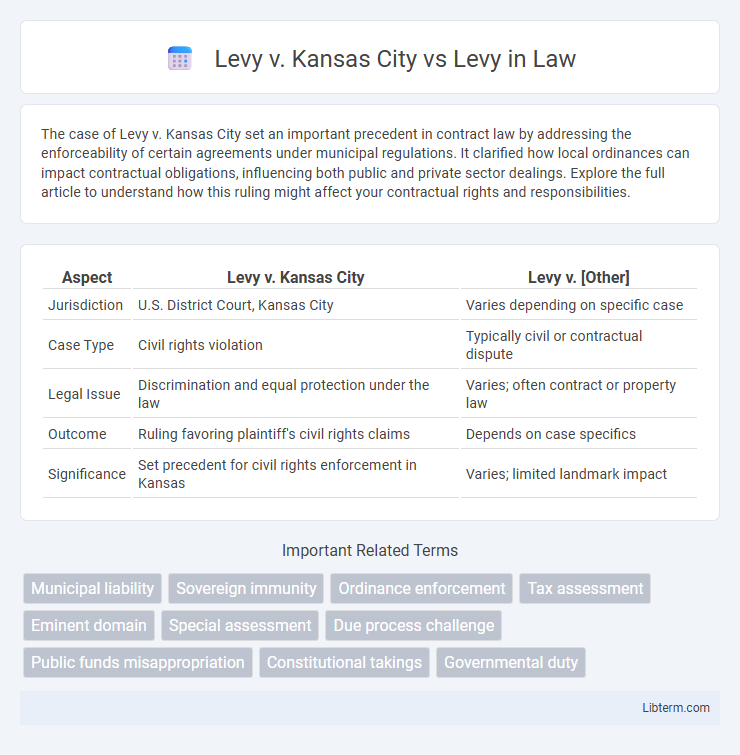The case of Levy v. Kansas City set an important precedent in contract law by addressing the enforceability of certain agreements under municipal regulations. It clarified how local ordinances can impact contractual obligations, influencing both public and private sector dealings. Explore the full article to understand how this ruling might affect your contractual rights and responsibilities.
Table of Comparison
| Aspect | Levy v. Kansas City | Levy v. [Other] |
|---|---|---|
| Jurisdiction | U.S. District Court, Kansas City | Varies depending on specific case |
| Case Type | Civil rights violation | Typically civil or contractual dispute |
| Legal Issue | Discrimination and equal protection under the law | Varies; often contract or property law |
| Outcome | Ruling favoring plaintiff's civil rights claims | Depends on case specifics |
| Significance | Set precedent for civil rights enforcement in Kansas | Varies; limited landmark impact |
Introduction to Levy v. Kansas City
Levy v. Kansas City was a landmark legal case addressing municipal liability and contractual obligations. The court examined the scope of Kansas City's responsibility in fulfilling agreements with contractors under specific statutory frameworks. This decision set critical precedents for municipal governance and contract enforcement in public works projects.
Background of the Levy Case
The Levy v. Kansas City case centers on a legal dispute involving creditor rights and debt collection practices within Missouri jurisdiction. The background of the case involves Levy, a creditor, challenging Kansas City's methods of debt enforcement and alleging violations of statutory and constitutional provisions. Key legal issues focus on the interpretation of municipal authority in regulating debt collection against individual debtors.
Overview of Legal Issues in Levy v. Kansas City
Levy v. Kansas City centered on the constitutional challenge to municipal authority regarding eminent domain and fair compensation under the Fifth Amendment. The case examined whether Kansas City's actions constituted an unlawful taking without just compensation, focusing on property rights and due process protections. Legal issues also included procedural fairness in the city's condemnation process and the limits of governmental power in urban redevelopment.
Key Parties: Kansas City and Levy
Kansas City acted as the municipal defendant in Levy v. Kansas City, involved in a legal dispute over alleged violations of city ordinances and property rights. Levy, the plaintiff, challenged Kansas City's actions, claiming infringement on constitutional protections related to property and due process. The case emphasized the balance between municipal authority and individual property rights within Kansas City's jurisdiction.
Summary of Court Proceedings
Levy v. Kansas City involved a dispute over contract enforcement and property rights, with the court examining the specific terms and actions of both parties. The proceedings detailed evidence on deed validity, contract interpretation, and precedential property law to assess the legitimacy of Levy's claims. Court rulings emphasized adherence to legal formalities and equitable principles to resolve conflicting interests in real estate transactions.
Major Arguments from Both Sides
Levy v. Kansas City centered on the plaintiff's claim that the city violated property rights by improperly seizing land without just compensation, arguing the action breached the Fifth Amendment. The city defended its position by asserting the seizure was necessary for public use under eminent domain and that legal procedures were properly followed. The court examined evidence regarding the adequacy of compensation and the legality of the city's condemnation process to resolve the dispute.
Court’s Ruling in Levy v. Kansas City
The Court in Levy v. Kansas City ruled that the municipal ordinance in question violated constitutional protections by imposing unreasonable restrictions on individual property rights without sufficient justification. This landmark decision emphasized that local governments must balance regulatory interests with fundamental property rights, ensuring ordinances do not arbitrarily infringe on legally protected ownership and use. The ruling reinforced the precedent that constitutional limits constrain municipal authority when regulatory actions become excessive or discriminatory.
Impact of the Decision on Levy
The decision in Levy v. Kansas City significantly affected Levy by affirming the city's liability in the wrongful injury claim, establishing a precedent for municipal responsibility in similar cases. This ruling ensured that Levy received appropriate compensation, reinforcing legal protections for individuals harmed due to municipal negligence. The case influenced future litigation strategies by emphasizing the importance of holding local governments accountable for public safety failures.
Legal Precedents Set by Levy v. Kansas City
Levy v. Kansas City established key legal precedents regarding municipal liability and governmental immunity in tort claims, emphasizing limits on city accountability for certain public employee actions. The case clarified the interpretation of statutory provisions governing city responsibilities, influencing subsequent rulings on public entity immunities in Kansas. Its precedents have been cited extensively in state courts when determining the scope of municipal obligations under tort law.
Conclusion and Future Implications
The decision in Levy v. Kansas City clarified key aspects of municipal liability and set a precedent for holding cities accountable for negligence in public services. This ruling emphasizes the importance of rigorous municipal oversight and may influence future cases by expanding citizens' rights to seek damages for governmental negligence. Ongoing legal interpretations will likely consider this case as a foundation for evaluating the scope of city responsibility and immunity in similar contexts.
Levy v. Kansas City Infographic

 libterm.com
libterm.com